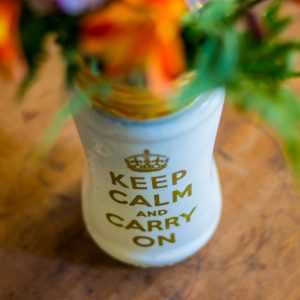
Uncertain times
It’s true that we are living in a time of uncertainty and turbulence with the continued spread of covid-19, an epic rollercoaster downhill ride on the stock market and increased concern and anxiety over the economy, our health and that of our loved ones.
This past week alone, we’ve witnessed various communications sharing updates of school closures, and cancelations of public events and performances. The messages, emails and news blasts keep flooding in.

We’ve made it through hard times
While we need to stay informed, there also is a need to practice a balanced approach of calm, connection, and preparedness during these challenging times. After all, we’ve been here before. Perhaps not in exactly the same way, but we can take a modicum of comfort in knowing we’ve managed to overcome monumental hurdles in the past.
We’ve made it through hard times.

History gives us examples of our ability to keep calm and carry on
If we look back at our more recent history, we’ve been through recessions, 911, SARS, and MERS.
If we look a little further back in history, we’ve faced World War II and just when we thought we had a breather, the Spanish Influenza struck in 1918.
Then, 10 years later, the Great Depression came a calling and overstayed its welcome like an unwanted distant relative who eats all your food, asks for money and keeps you up at night from their loud snoring.
On the heels of the depression, World War II carved a global path of strife and destruction. Yet through it all, we managed to find ways to come together, fight for freedom, fight for our well-being and our livelihoods.
As Winston Churchill said, “If you’re going through hell, keep going”. His words hold as true today as they did in the 1940s.
But there is another famous British quote that truly resonates, “Keep Calm and Carry On”.
This slogan came from the British government and was designed to motivate people to stay strong. Perhaps it is apropos today as a helpful mantra for dealing with these uncertain times.
We have resources
When hard times hit us, it’s helpful to remember we have resources at our disposal and will benefit from using them well and wisely to stay connected and work together. Let’s use technology and online ways of communicating to make informed decisions that help us keep calm and prepared.
What’s triggered such uncertainty in 2020?
News of Covid-19 first appeared in government reports from China back in November 2019. As the virus spread to other countries, and it continued to top new feeds on a daily basis since then, it’s important to level set by providing a brief overview of some Covid-19 frequently asked questions.

What is COVID-19 and how is it spread?
Covid-19 is an illness caused by a coronavirus. Human coronaviruses are common and are typically associated with mild illnesses, similar to the common flu.
Coronaviruses are most commonly spread from an infected person through respiratory droplets when you cough or sneeze, close personal contact, such as touching or shaking hands, touching something with the virus on it, then touching your eyes, nose or mouth before washing your hands. These viruses are not known to spread through ventilation systems or through water.
Symptoms may be very mild or more serious and can take up to 14 days to appear after exposure to the virus.
If you have symptoms, you should stay home to avoid spreading it to others. If you live with others, stay in a separate room or keep a 2-metre (6 feet) distance.
Call ahead before you visit a health care professional or call your local public health authority and tell them your symptoms and follow their instructions. If you need immediate medical attention, call 911 and tell them your symptoms.

Prevention Tips
Here’s a quick list of commons sense tips to consider at any time to keep well and avoid a contagion:
- Wash your hands often with soap and water for at least 20 seconds, but a full minute is better. Watch this video for a demonstration of proper hand washing techniques.
- Carry hand sanitizers with you for those moments when a sink with soap and water isn’t available;
- Avoid touching your eyes, nose or mouth, especially with unwashed hands;
- Avoid contact with people who are sick;
- If you have been in contact with body fluids of an ill person — where they coughed or sneezed on you and you weren’t wearing a mask — contact your local Public Health Authority for instructions;
- Maintain social distancing — this means remaining out of places where people meet or gather and avoiding local public transportation (bus, subway, taxi, ride share) and maintaining distance of approximately 6 feet or 2 metres from others;
- When coughing or sneezing, cover your mouth and nose with your arm or tissues to reduce the spread of germs;
- When greeting someone, consider a wave instead of a handshake or hug;
- Clean your smart phone and any touchscreens with a 70 percent alcohol-based wipe;
- If you have a fever, cough and difficulty breathing, seek medical care early;
- Don’t succumb to the hoard mentality. Think about what you might need to have on hand if you or a loved one become ill and just add a few extra items to your grocery cart every time you shop;
- Consider grocery shopping online with a delivery service. Canadian examples include: InstaCart.ca, grocerygateway.com, onthemoveorganics.ca. There are many others, so check out what is available in your neighbourhood;
- Use debit instead of cash when making in-person purchases;
- If you are a parent, be a role model and practice good self care and infection control. Take breaks, get plenty of sleep, exercise and eat a healthy and well-balanced diet.
- Stay connected with others and maintain healthy relationships: call, text, Facetime or Zoom video call are all options to connect without meeting in person if you are worried;
- Avoid speculation and only share accurate information from reliable, credible sources like WHO, CDC and a public health authority;
- Avoid panicking and discrimination (xenophobia)

A time for victory of the human spirit
Remember it is human nature to come together during times of crisis and demonstrate a victory of the human spirit. History shows us that, time and again, we have the ability to rise above panic and act bravely, operate with compassion and give with love. These trying times call on us to keep calm and carry on.



